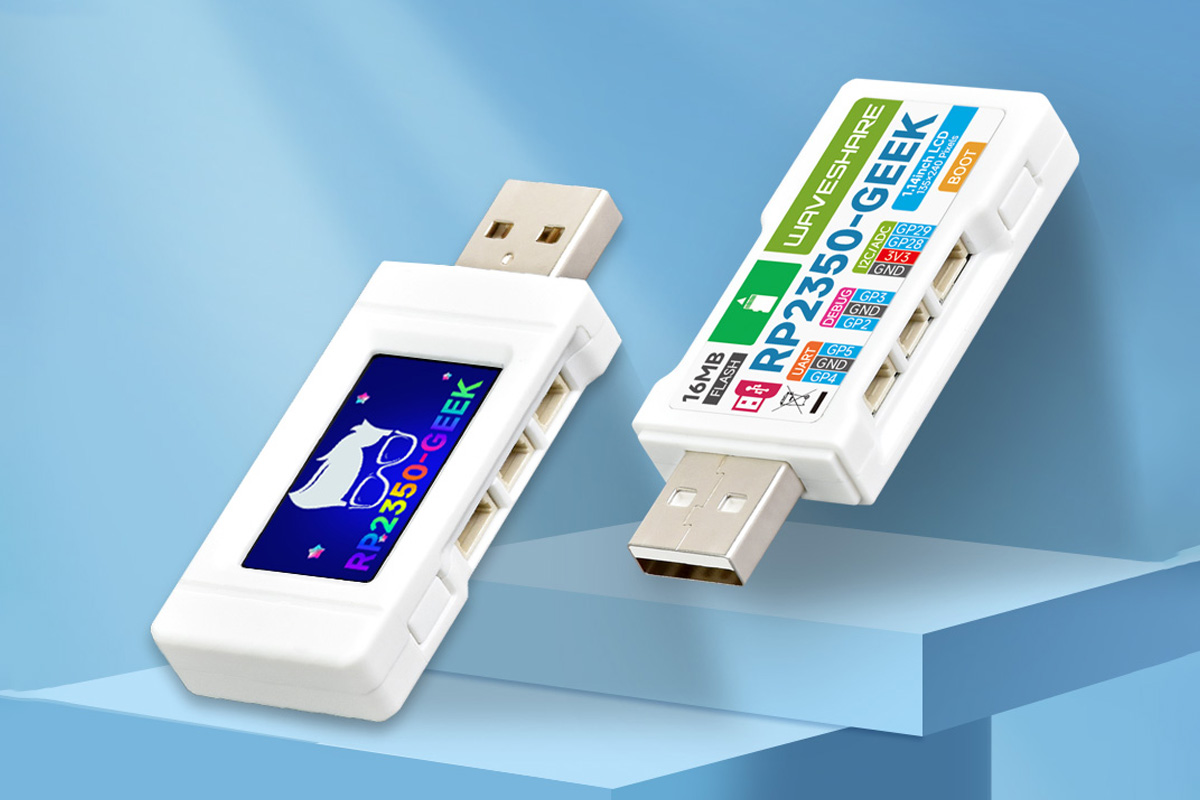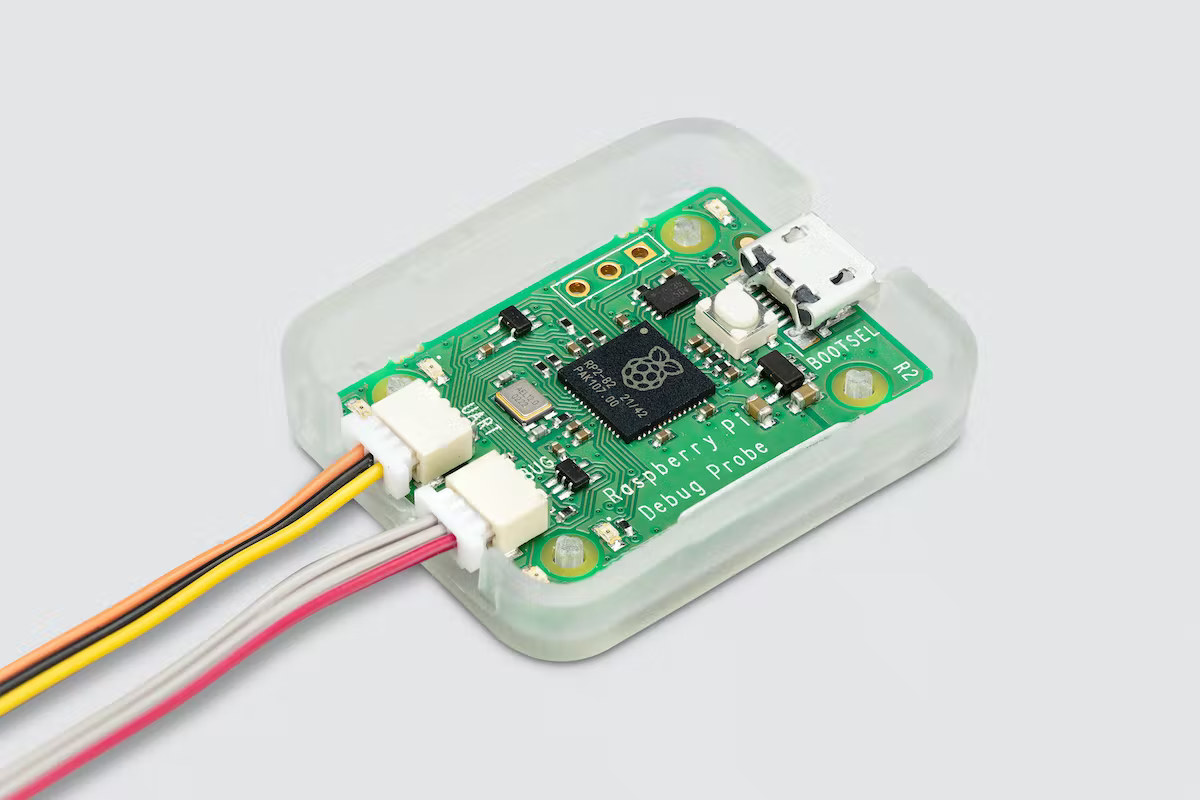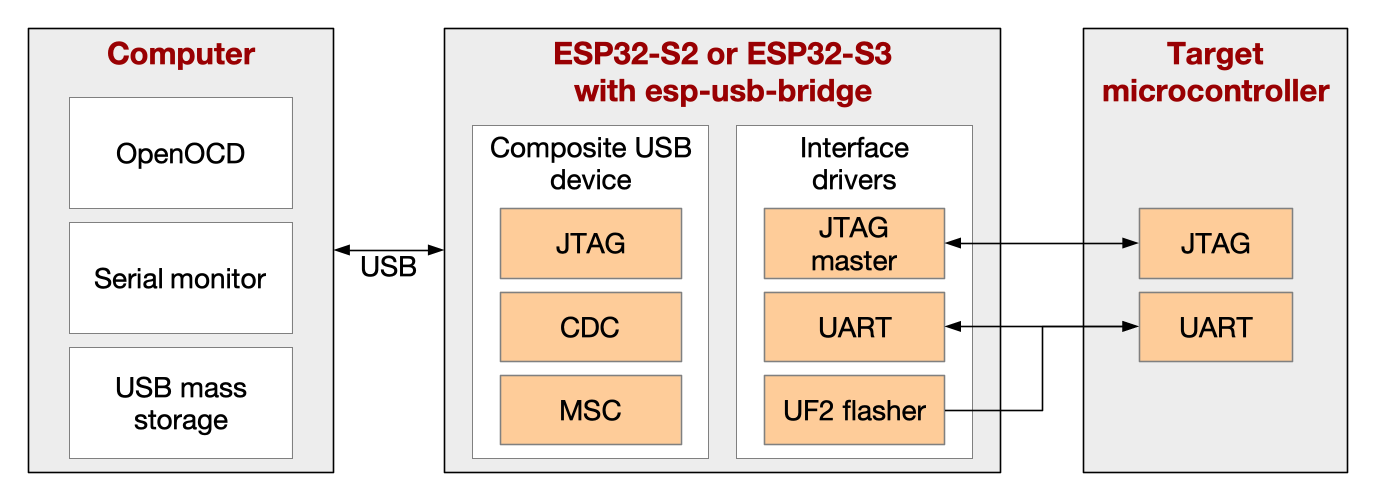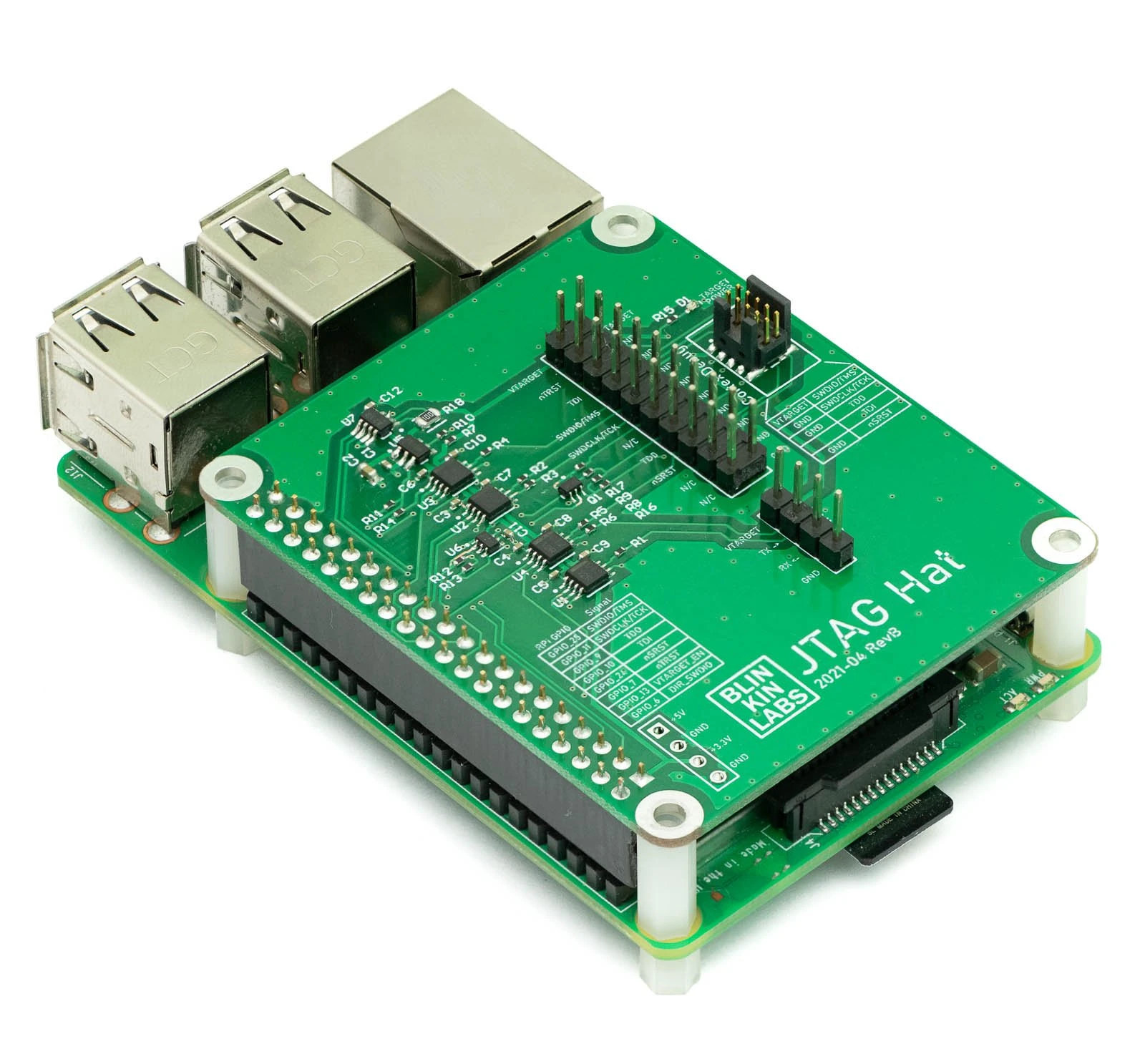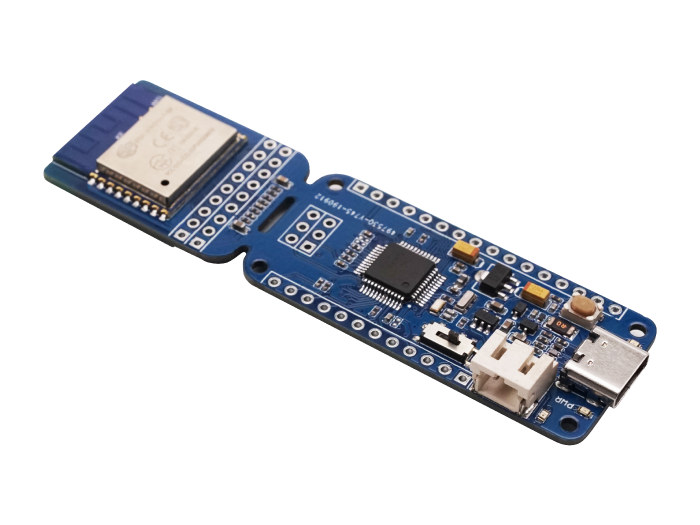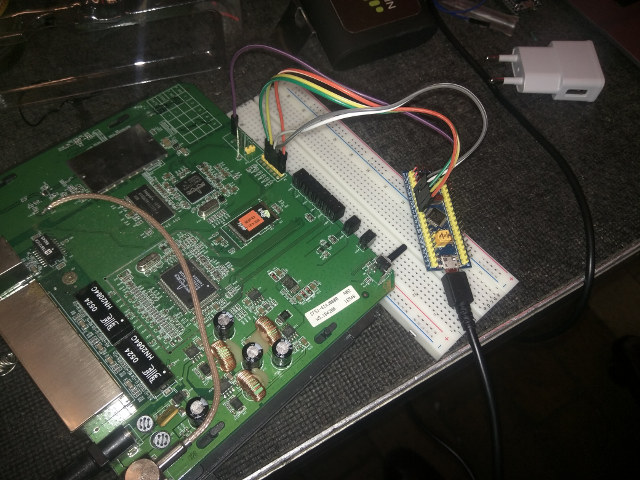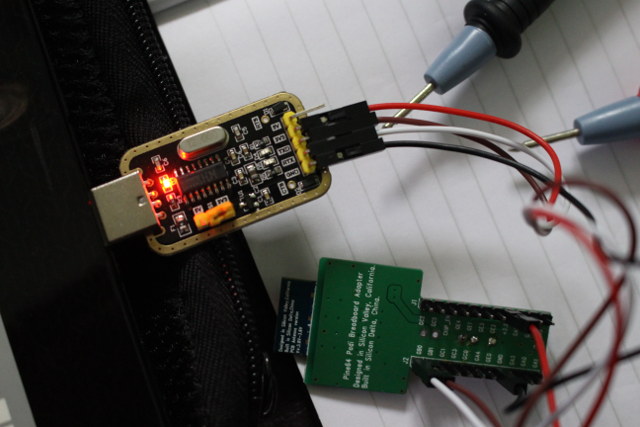Waveshare has recently launched the RP2350-GEEK USB development board which can also be used as a debugger for Raspberry Pi boards and other Arm-based targets. Built around the Raspberry Pi RP2350 MCU this development board/debugger features a 1.14-inch 65K color IPS LCD, a USB Type-A interface, a microSD card slot supporting SDIO and SPI communication, 16MB NOR-Flash, and multiple interfaces, including 3-pin SWD, USB to UART, and I2C ports. The board is compatible with standard CMSIS-DAP debugging tools like OpenOCD, which attaches to Raspberry Pi’s 3-pin debug connector for debugging. It also features open-source firmware for easy upgrades. Housed in a plastic case, the development board looks like a USB drive and is suitable for debugging, testing, and firmware development in IoT, embedded systems, and educational projects. Waveshare RP2350-GEEK Raspberry Pi debugger specifications Microcontroller – Raspberry Pi RP2350A MCU CPU – Dual-core Arm Cortex-M33 processor @ 150MHz Memory – 520KB internal RAM […]
Raspberry Pi Debug Probe eases bare metal development for $12
The Raspberry Pi Debug Probe is a USB serial adapter based on the Raspberry Pi RP2040 microcontroller and designed to debug the Raspberry Pi Pico, third-party RP2040 boards, and pretty much any Arm board through SWD and/or UART interfaces. The main advantage over a typical USB-to-serial adapter is the presence of a Serial Wire Debug (SWD) bridge used for bare metal code development and debugging through tools such as OpenOCD. The Raspberry Pi Debug Probe specifications: MCU – Raspberry Pi RP2040 dual-core Cortex-M0+ microcontroller @ 133 MHz with 264KB SRAM Storage – 2MB SPI flash (W25Q16JVUXIQ) Debug interfaces 3.3V Serial Wire Debug (SWD) 3-pin JST connector conforming to the Raspberry Pi Debug Connector Specification and compatible with the CMSIS-DAP standard 3.3V serial (UART) 3-pin JST connector USB – Micro USB port to connect to the host Misc BOOTSEL button for flashing firmware to the debug board Unpopulated 3-pin header with […]
ESP USB Bridge project converts ESP32-S2 or ESP32-S3 into a USB to UART/JTAG chip
Espressif’s ESP USB Bridge is a project based on the ESP-IDF that leverages ESP32-S2 or ESP32-S3 USB interface to use the board as a USB to UART or USB to JTAG debug board. It can serve as a substitute for USB to TTL debug boards based on CH340 or CP2104 for instance, be used with OpenOCD in JTAG bridge mode, and also flash UF2 firmware file to the target board. As just mentioned, there are three main use cases: Serial bridge mode with a terminal program or a firmware flashing tool like esptool. In that case, it just works like your typical USB to TTL debug board JTAG bridge mode for JTAG debugging with OpenOCD, and if the target board is based on ESP32, you can use openocd-esp32 project Mass storage device where the board can be accessed by a file manager on the host computer. One of the specific […]
JTAG Hat for Raspberry Pi eases debugging with OpenOCD
Low-level debugging can be performed with a JTAG debugger and OpenOCD open-source software, but since not everybody may have a JTAG debugger at home, some have reverted to using the Raspberry Pi as a JTAG debugger, and you’ll find instructions for cabling and installing the software on the Internet. Matt Mets of BlinkinLabs have been using the Raspberry Pi SBC and OpenOCD to debug Arm-based microcontroller boards for a while, but found it to be a pain to find jumper wires and look up the pin-outs manually each time. So he designed a JTAG Hat with properly labeled 20-pin .1″ and 1.27mm Cortex debug connectors to speed up the process. The expansion board also adds level-shifting buffers to interface with targets running at 1.8-5V, transistor-based power reset pins, a power switch for optionally supplying 3.3V to the target, a voltage/current sensor for measuring the target power consumption, and a buffered […]
Some Interesting Talks from FOSDEM 2020 Schedule
We wrote about IoT devroom call for proposals for FOSDEM 2020 a little while ago, and as the free open-source developer meetup is getting closer, FOSDEM 2020 organizers released the schedule. So I’ll look at some of the talks in the relevant devrooms such as the Internet of Things, hardware enablement, Embedded, Mobile and Automotive, as well as RISC-V and others to compose my own little virtual schedule for the 2-day event. Saturday, February 1 10:30 – 10:50 – How lowRISC made its Ibex RISC-V CPU core faster – Using open source tools to improve an open-source core – by Greg Chadwick Ibex implements RISC-V 32-bit I/E MC M-Mode, U-Mode, and PMP. It uses an in-order 2 stage pipe and is best suited for area and power-sensitive rather than high-performance applications. However, there is scope for meaningful performance gains without major impact to power or area. This talk describes work […]
Wio Lite RISC-V WiFi Board with ESP8266 Module Launches for $6.9
Released this summer, GigaDevice GD32V generated a lot of buzz, as a cheap general-purpose 32-bit RISC-V MCU, and soon after the $5 Longan Nano development board with LCD display and enclosure was launched to the market. However, many applications benefit or require some network connectivity with WiFi. Espressif Systems is a founding member of the RISC-V Foundation, so RISC-V WiSoCs (Wireless SoCs) are coming, but AFAIK none of those are available yet. In the meantime, Seeed Studio has launched Wio Lite RISC-V board which brings WiFi connectivity to GD32V MCU through an ESP8266 WiFi module. Wio Lite specifications: MCU – Gigadevice GD32VF103CBT6 RISC-V (rv32imac) microcontroller @ 108 MHz with 128KB Flash, 32KB SRAM Wireless Module – ESP8266 WiFi Wio Core with 802.11b/g/n/ WiFi 4 connectivity Storage – MicroSD card slot USB – 1x USB Type-C port for power and programming Expansion – I/O headers for GD32 MCU, I/O header for […]
DirtyJTAG Firmware Convert $2 STM32 “Bluepill” Boards or ST-Link V2 Clones into JTAG Adapters
DirtyJTAG is a JTAG adapter firmware for cheap STM32 boards like BluePill or equally inexpensive ST-Link V2 clones that was developed to create an alternative to the cheap – but now obsolete – LPT Wiggler cables, and more expensive USB JTAG probes. You’ll find the source, and documentation on Github. First, you’ll need to flash the firmware using the DFU method or an SWD programmer (for ST-Link) or USB to TLL debug board (for STM32 dev boards), before making the connection to the target board as shown below (for Bluepill). STM32 JTAG PA0 TDI PA1 TDO PA2 TCK PA3 TMS PA4 TRST PA5 SRST You can then use mainline UrJTAG for your newly flashed JTAG adapter. If you prefer OpenOCD, it might eventually be possible to use Versaloon firmware instead on STM32 Bluepill board. Thanks to Zoobab for the tip. Jean-Luc Aufranc (CNXSoft)Jean-Luc started CNX Software in 2010 as a […]
Getting Started with Pine64 PADI IoT Stamp – Part 2: Serial Console, GCC SDK, Flashing & Debugging Code
PADI IoT Stamp module powered by Realtek RTL8710AF ARM Cortex M3 WiFi SoC is a potential competitor to Espressif ESP8266 modules. Pine64, the manufacturer of the module, sent me their kit with a $2 IoT stamp, a breakout board, a USB to TTL debug board and a J-Link debug board. In the first part of the review I’ve shown the hardware and how to assemble PADI IoT stamp kit. In the second part I’m going to write a tutorial / getting start guide showing how to control the board with AT commands, build the firmware with GCC SDK, and finally demonstrate how to flash and debug the firmware with the J-Link debugger. The Quick Start Guide indicates you need to connect the USB to TTL debug board to UART2 instead of UART1 as I did on the very similar B&T RTL-00 RTL8710AF module, and set connection settings to 38400 8N1. […]


